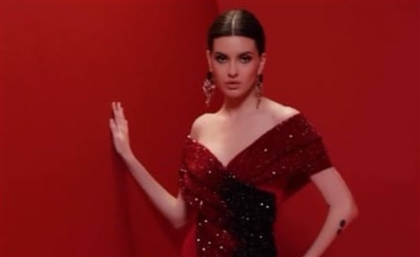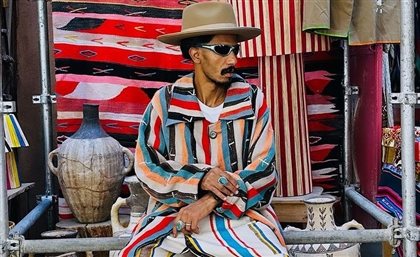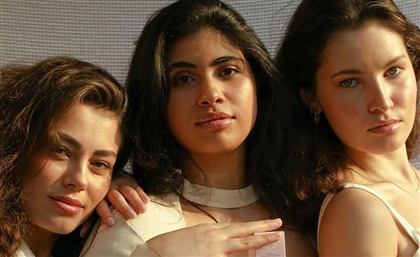Caught in an endless spiral aptly referred to as 'Can't Culture', Monica Gerges meets up with Haj Mohamed Galal, a carpenter who proves that anything CAN be accomplished if you have the right perspective.
In the words of a great Phoebe Buffay, "Plan? I don't even have a pla-!" Yeah, neither do I, Phoebs. A friend recently challenged me to come up with a five-year plan for my life. Having recently abandoned all of my plans for the foreseeable future, gotten a job, packed my bags, and moved to Egypt - all in eight days, might I add - the idea of a five-year plan was slightly beyond the scope of my understanding. But, of course, I took the challenge anyway, leaving my poor friend on the receiving end of a clusterfuck of whiney messages that all basically entail the same thing: "But Mina, I can't!" There are a lot of things in my life that I've claimed I can't do, swearing up and down to God above that these things really are beyond my abilities. I can't meet this deadline; I can't move and leave my family; I can't commit to this right now; I can't be a writer. Every once in a while, someone dear to my heart would opt to call out my bullshit - "it's not that you can't, Monica, it's that you're making excuses not to." I rarely ever admitted it, but he was right. I'm not incapable; so, the question here begets itself: why the hell do I keep saying that I can't? I'm not bound by a ball and chain, nor am I physically or mentally restricted in any way. Without ever knowing it, I realize I had become part of what I choose to call 'can't culture'. Chatting with Haj Mohamed Galal, I realised that it was a matter of weg'het nazar (perspective).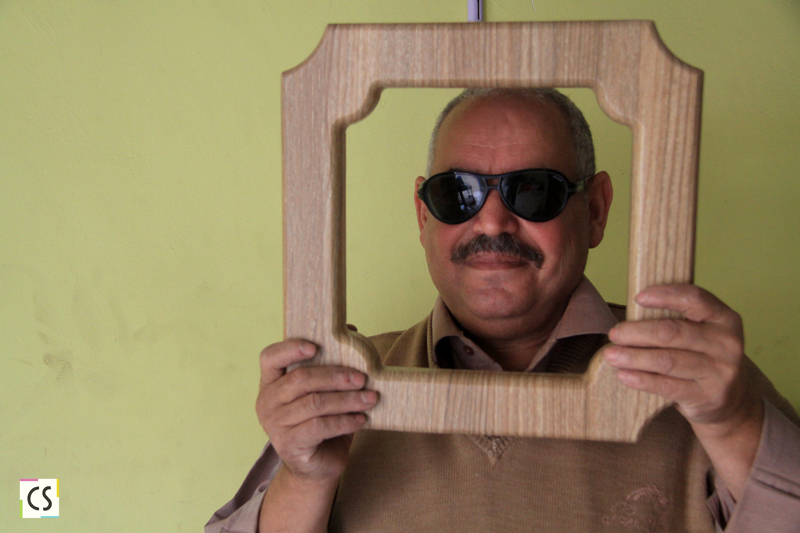 Meet Haj Mohamed Galal - a 62-year-old carpenter, father, and a man of great imagination and skilled handiwork. He works out of a shop with no name in an area off of Gesr El Suez we only know as Share3 El Arbe3een. But, don't worry; ask around the neighbourhood and anyone will tell you where to find him. With a warm cup of tea and a cool glass bottle of Pepsi, staples of authentic Egyptian hospitality, he welcomed me into his humble shop and showed me his handiwork. "I would love to open up a showroom in Europe someday," he told me as a warm smile graced his face. However, as with every story, there is a catch.
Meet Haj Mohamed Galal - a 62-year-old carpenter, father, and a man of great imagination and skilled handiwork. He works out of a shop with no name in an area off of Gesr El Suez we only know as Share3 El Arbe3een. But, don't worry; ask around the neighbourhood and anyone will tell you where to find him. With a warm cup of tea and a cool glass bottle of Pepsi, staples of authentic Egyptian hospitality, he welcomed me into his humble shop and showed me his handiwork. "I would love to open up a showroom in Europe someday," he told me as a warm smile graced his face. However, as with every story, there is a catch.

Haj Mohamed Galal is blind. Following an accident he opted not to discuss, he lost sight in one eye and subsequently the other. He worked as a carpenter before his recruitment into the army, and his accident happened on the same day of his release - "not because of the army," he was sure to add. In spite of his disability, Haj Mohamed continues to diligently create craftsman woodwork from tea tables and frames to desks made to assemble, Ikea-style. While he's unable to create things as based on someone else's designs, Haj Mohamed uses his memory and his imagination to call to mind ideas that he works to bring to life. Brimming with pride, he took me through a show and tell of some of his work and the standard of quality he always strives to meet. "[People with disabilities] want to work and to produce good work, at that, so people will actually buy it. We want to produce things that are of high quality," Haj Mohamed tells of his work, explaining that "if we don't produce good work, the price drops." Haj Mohamed is committed to quality, though, defying his disability and regularly finds ways to better himself professionally. Demonstrating his new machine, he explained: "I got this machine so I can drill nails in the exact spot they need to be. I invested in this because it'll make my work better."

A humble man with great aspirations, Haj Mohamed comes across many perils in his life as a result of his blindness, but they are often at the hands of others. "Yesterday I gave a toktok driver a bill for 10 pounds to bring me to the shop," he says, beginning to tell a story. "He asked me to exchange the bill because it was worn, so I agreed and took it back, giving him another one. It turns out he gave me a piece of paper instead of the bill I gave him," tells an exasperated Haj Mohamed. Unfortunately, such a story comes as no surprise. How easy is it to pick on those who are most vulnerable? That question requires no answer. "Us people with disabilities really struggle here; people have no empathy for us," Haj Mohamed laments, adding, "Although, we work! We don't ask for people to give us things; we just need people to acknowledge us and empathize with us."

Outside of a shop poetically unnamed, I found myself challenged by Haj Mohamed's story and ashamed of myself. I've come to understand that there is a large demographic of people who have immersed themselves in this 'can't culture'. The easiest thing to say after "I don't know" is "I can't." Echoing Orwell's lamentations on the slovenliness of the English language, I can't help but wonder why we've opted to use 'can't' instead of 'don't want to' or 'am too lazy' when we're searching for excuses? It seems that we must subscribe to this 'can't culture' to disguise our vices and scapegoat our laziness on capability.

Haj Mohamed has an easy way out - he could choose to succumb to his disability and accept charity from whoever choses to give it. He refuses. "I don't want charity because I don't want to be a sha7at. You could say it's help but at the end of the day, still a sha7at," Haj Mohamed explains. "But lately I've been asking for help, not charity. I want to do an exchange," he suggests. "I have a lot of desks I've made, for example. Someone can take them and give me wood in exchange; that way I can keep working. I'll only take help in exchange for something," he insists, adding "I don't need treatment or charity or anything else - I just need wood. That gives me the incentive to work"

Haj Mohamed is a man of many aspirations. "I'm a man who works," he explains. "Why can't I aspire to one day have a car and a personal driver and air conditioning?" Someday he hopes to "present a speech to the United Nations on people with physical disabilities," he tells of his aspirations. To Haj Mohamed, his loss of sight is merely a road bump to overcome and not a roadblock halting the progression of his life, achievements, and aspirations. When disability could have stopped him, he proves himself able every day as he chooses to overcome his road bump and strive to do something with his life. Why, then, do we choose to create roadblocks out of road bumps? From the smallest task to the biggest dream, why do we come up with excuses for not accomplishing things? Why do we let our fear of failure crush our aspirations and convince us that we can't dream, plan, and achieve? It seems that for us able-bodied can't-culturians, we are our own disability.
In the words of a man whose early life circumstances could have led him to say that he can't, "You're never too old to set another goal or to dream a new dream." - C.S. Lewis.
In honour of the United Nations' International Day of Persons With Disabilities, we would love if we could support Haj Mohamed in the way he specifically needs. If you or anyone you know is interested in seeing or purchasing this incredible man's handiwork, or is able to provide him with wood to work with, please contact him at 01001155454; but, please note, he only speaks Arabic.
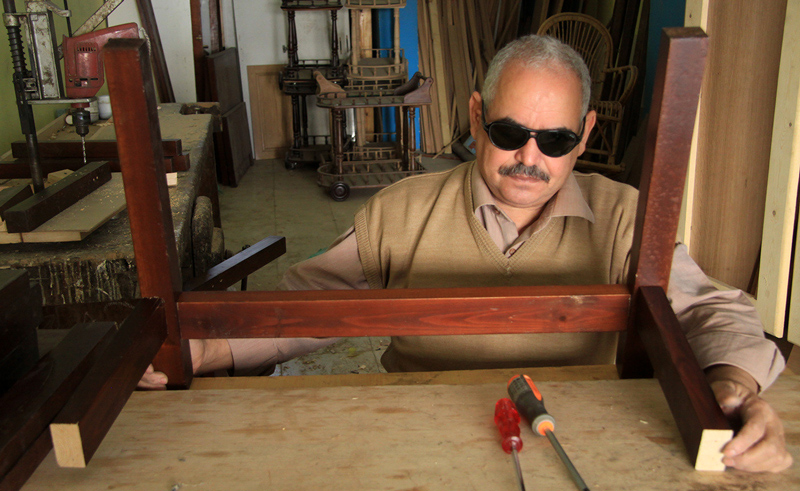
 Meet Haj Mohamed Galal - a 62-year-old carpenter, father, and a man of great imagination and skilled handiwork. He works out of a shop with no name in an area off of Gesr El Suez we only know as Share3 El Arbe3een. But, don't worry; ask around the neighbourhood and anyone will tell you where to find him. With a warm cup of tea and a cool glass bottle of Pepsi, staples of authentic Egyptian hospitality, he welcomed me into his humble shop and showed me his handiwork. "I would love to open up a showroom in Europe someday," he told me as a warm smile graced his face. However, as with every story, there is a catch.
Meet Haj Mohamed Galal - a 62-year-old carpenter, father, and a man of great imagination and skilled handiwork. He works out of a shop with no name in an area off of Gesr El Suez we only know as Share3 El Arbe3een. But, don't worry; ask around the neighbourhood and anyone will tell you where to find him. With a warm cup of tea and a cool glass bottle of Pepsi, staples of authentic Egyptian hospitality, he welcomed me into his humble shop and showed me his handiwork. "I would love to open up a showroom in Europe someday," he told me as a warm smile graced his face. However, as with every story, there is a catch.

 Outside of a shop poetically unnamed, I found myself challenged by Haj Mohamed's story and ashamed of myself. I've come to understand that there is a large demographic of people who have immersed themselves in this 'can't culture'. The easiest thing to say after "I don't know" is "I can't." Echoing Orwell's lamentations on the slovenliness of the English language, I can't help but wonder why we've opted to use 'can't' instead of 'don't want to' or 'am too lazy' when we're searching for excuses? It seems that we must subscribe to this 'can't culture' to disguise our vices and scapegoat our laziness on capability.
Outside of a shop poetically unnamed, I found myself challenged by Haj Mohamed's story and ashamed of myself. I've come to understand that there is a large demographic of people who have immersed themselves in this 'can't culture'. The easiest thing to say after "I don't know" is "I can't." Echoing Orwell's lamentations on the slovenliness of the English language, I can't help but wonder why we've opted to use 'can't' instead of 'don't want to' or 'am too lazy' when we're searching for excuses? It seems that we must subscribe to this 'can't culture' to disguise our vices and scapegoat our laziness on capability. 







